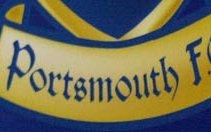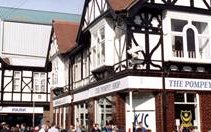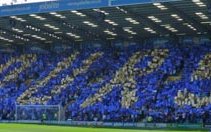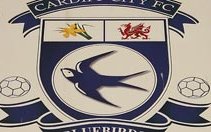An article suggestion from Lemmi who returns with some more ‘snippets that he has managed to unearth’ – read on for more.
Further to the Alternative History of Pompey I thought I would share some more snippets that I have managed to unearth.
After the Romans left these shores, the ancient Britons were left to fend for themselves. I have previously mentioned that the invading Saxons were defeated and then welcomed by the great Pompeyite leader Linvius Primus (Linvius the First). The following centuries are known as the Dark Ages, as little is known, but one man’s legend has been handed down to us; Arthur, Knight and later King, of the Pompeyites. He took them from the relative obscurity of the Southern League of English tribes to the brink of national importance and his exploits have passed into folklore.
When King Alfred hid in Farlington Marshes, in order to regroup his forces, he famously burnt the cakes. These are commemorated to this day at Fratton Park with the various burnt offerings for sale on match days. Alfred founded the Royal Navy at Portsmouth, thus ensuring that the name of Pompey would be spread worldwide.
The Middle Ages were a particularly difficult period to be alive. It was nasty, brutish and short. This was a time of plague and civil war. Many battles were fought over who should be King. Henry IV had seized the throne for the Pompeyites but was challenged by Harry Hotspur in 1403, at the Battle of Wembley. Hotspur was seen off and his army ran away. Hotspur was killed when he lifted his visor and a shot from Prince Boateng pierced his defence.
A few years later Henry V took on the French in an away fixture, as pointed out by vital member russellm. The night before, Henry made a stirring speech; in which he exhorted the troops to win the day. As the bard did (almost) say;
We few, we happy few, we band of brothers;
For he to-day that sheds his blood with me
Shall be my brother; be he ne’er so vile,
This day shall gentle his condition;
And gentlemen in Pompey now-a-bed
Shall think themselves accurs’d they were not here,
And hold their manhoods cheap whiles any speaks
That fought with us upon Saint Dickenson’s day.
Henry VII feared invasion from the French so he tried to redevelop Fortress Fratton. Unfortunately due to some opposition from the local council and a Russian called Ivan the Terrible who owned some of the land he had to make do with building Southsea Castle. This gave him a marvellous vantage point to see one of the worst own goals seen at Portsmouth when Sir George Carew put through his own net and sunk The Mary Rose.
As England, and then Britain, expanded her empire, the Pompeyites were there helping to spread the game we all love; engaging in a little drinking and ‘high spirits’ on the way. After enjoying an extremely long undefeated run in North America, they came up against the colonialists who were determined to gain victory. A win against Boston United at Bunker Hill gave the touring Pompeyites hope but they ultimately succumbed to York Town (later York City), losing on penalties after extra time.
Defeated, but not disheartened, our heroes went on a tour of Europe, winning many games in Spain and Portugal before picking up their first European trophy against a French team led by Napoleon in Belgium. It was a close run thing but they brought on their German substitute Blucher who supplied the cross for the decisive blow in the last minute of extra time. Some say the Golden Goal rule was being used but this is disputed.
The empire continued to grow and the lads went on a tour of South Africa, their most famous victory being a narrow win in Natal. This was achieved with a defensive tactic called Rookes Drift. There followed a win in Sudan, unfortunately losing their midfield general Charles Gordon in the first half. A return to South Africa brought a game against Dutch farmers which went to a replay.
There are many more stories of Pompey’s great history which I am researching and hope to bring you soon.
A couple of you may have spotted a couple of ex Pompey players in this. If you have, congratulations and for your prize you can award yourself the Pompey Smartipants Award (1st class with oak leaf cluster)
Written by Lemmi.
The views within this article are the views of the individual who wrote and submitted this piece, sometimes solely theirs. They are not necessarily shared by the Vital Pompey Site Journalists.





